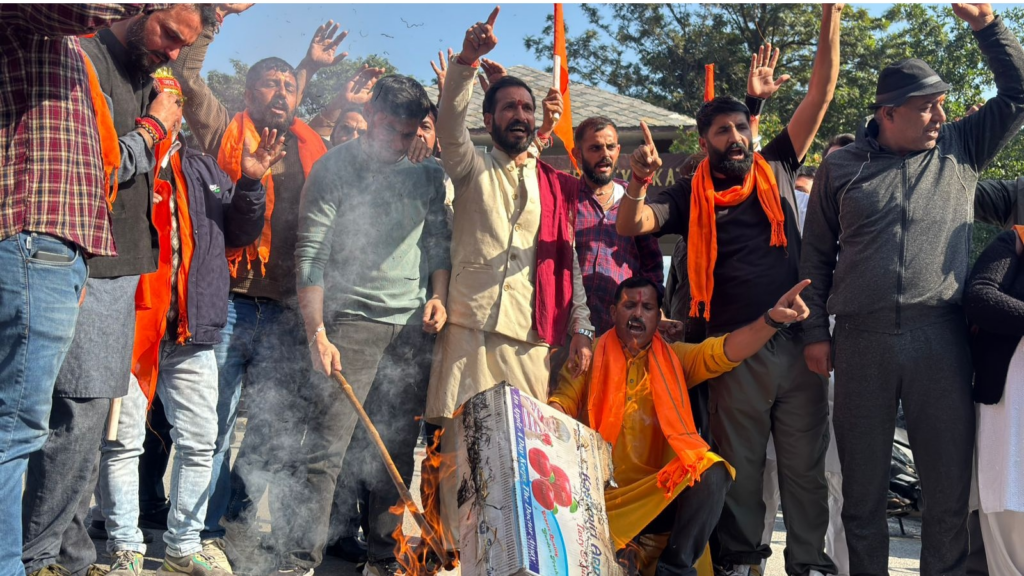Outfits associated with the Sangh Parivar have launched protests in the Jammu region demanding that the Katra-based Shri Mata Vaishnodevi Institute of Medical Excellence scrap the admission list for its first batch of students, as 90% of them are Muslims belonging to Kashmir.
BJP Udhampur MLA R S Pathania has supported the protests, spearheaded by the VHP and Bajrang Dal. Their main contention is that an institute set up with donations offered to the Vaishno Devi shrine should not be dominated by members of the Muslim community, and that seats be reserved for Hindus.
Under the rules, this is not possible as the Vaishnodevi medical institute is not classified as a minority institute.
The protests erupted after the J&K Board of Professional Entrance Examinations (JKBOPEE) cleared a list of 50 candidates for the Vaishnodevi medical institute, 42 of them hailing from Kashmir and eight from Jammu. Of them, 36 from Kashmir have already taken admission, and three from Jammu have done so.
The VHP and Bajrang Dal have held demonstrations outside the Katra institute and burnt the effigy of the Chief Executive Officer of the Vaishno Devi Shrine Board.
VHP J&K president Rajesh Gupta said admissions for the 2025-26 session should be put on hold, and the management should correct its “mistake” and ensure that a majority of the students picked for the next one are Hindus. He called the list of 50 drawn up this time “a conspiracy to Islamize the medical college”.
Bajrang Dal J&K president Rakesh Bajrangi alleged bias on the part of the JKBOPEE in preparing the list. He said the management should have instead made admissions from the central NEET pool, which had candidates from all over India, as the college had been set up from donations by pilgrims across the country.
“We have no objection to candidates from Kashmir taking admission in any other medical college, but seats should be reserved for Hindu candidates in the Vaishnodevi college, as it has come up with Vaishno Devi shrine donations,” Bajrangi said.
BJP MLA Pathania said, “Even minority institutes that get government funding have seats reserved for the community which they claim to represent… Here, the institute does not take a single penny from the government and runs on donations made by Vaishno Devi pilgrims. So seats should be reserved for Hindu students as the issue involves the faith of pilgrims.”
Officials, who did not want to be named, pointed out that the admissions were in order, and as per National Medical Council (NMC) guidelines, which specify that admissions to all the 1,685 seats in the 13 medical colleges of J&K be done as per the NEET list. The other condition is that 85% of the seats be reserved for UT domiciles, with 15% open to candidates from the rest of the country.
The JKBOPEE is meant to prepare the list for seats reserved for domiciles in government colleges and for all in private colleges, on the basis of the NEET rankings. It then sends names to colleges following counselling with candidates.
In the case of the Vaishnodevi college, the admissions started late, following the NMC’s nod on September 8. By that time, the first round of counselling for medical colleges in J&K was concluded and the second round was also nearing completion. So the list for the Shri Mata Vaishnodevi Institute of Medical Excellence was prepared after a third round of counseling.
The JKBOPEE shortlisted 5,865 UT domicile candidates in all for the 13 medical colleges. Of these, it called 2,000 candidates for counselling. Incidentally, in this list too, over 70% of the candidates belonged to the Muslim community. While 87 candidates from Jammu took admission in the five government medical colleges in Kashmir, most of them were against seats reserved for SCs/STs, EWS and residents of areas along the Line of Control and International Border.
However, officials said, this pattern was not new and was in line with a recent trend. While there are more seats available in medical colleges in the Jammu region, 900, compared to 675 in Kashmir, most of these seats have been taken up by students from Kashmir in the past few years.
Officials said that in case of engineering seats, the reverse is true, with students from Jammu more likely to opt for them.
Sources said that college authorities earlier asked the Centre and NMC to allow them to admit students from the central pool prepared by NEET. However, the request was turned down as the NMC allows such admissions only in case of government institutions, or premier institutions like AIIMS and PGIs, which are established by an Act of Parliament, or in case of Deemed Universities.
The National Conference’s Jammu province president, Rattan Lal Gupta, put the blame on the Shri Mata Vaishno Devi Shrine Board, which runs the college. “While applying to the NMC for setting up a medical college, it should have also sought minority status.”
As the Shrine Board did not seek such a status, the JKBOPEE had no choice but to select students on the basis of merit obtained by them in NEET, Gupta said, adding: “Most of the students with higher merit happened to be from the majority community (Muslims) in Kashmir.”

